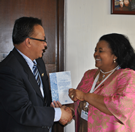Group of Like-Minded Megadiverse Countries (LMMC)
Background and history
The Like-Minded Megadiverse Countries (LMMC) is a group of countries that harbour the majority of the Earth's species and are therefore considered extremely biodiverse. They are rich in biological diversity (60-70% of the world’s biodiversity) and associated traditional knowledge. These countries have effectively joined efforts in negotiating the development of the Nagoya Protocol on Access to Genetic Resources and the Fair and Equitable Sharing of Benefits arising from their utilisation to the Convention on Biological Diversity (CBD), which was adopted in Japan in 2010. 18 in total, these countries are located in, or partially in, tropical or subtropical regions.
In February 2002, the Ministers in charge of the Environment and the Delegates of Bolivia, Brazil, China, Colombia, Costa Rica, Democratic Republic of the Congo, Ecuador, India, Indonesia, Kenya, Madagascar, Malaysia, Mexico, Peru, Philippines, South Africa, Venezuela, assembled in the Mexican City of Cancún. These countries declared to set up a Group of Like-Minded Megadiverse Countries as a mechanism for consultation and cooperation so that their interests and priorities related to the preservation and sustainable use of biological diversity could be promoted. They also declared that they would call on those countries that had not become Parties to the CBD, the Cartagena Protocol on Biosafety, and the Kyoto Protocol on climate change to become parties to these agreements.
At the same time, they agreed to meet periodically, at the ministerial and expert levels, and decided that upon the conclusion of each annual ministerial meeting, the next rotating host country would take on the role of Secretary of the group, to ensure its continuity, the further development of cooperation among these countries and to reach the agreements and objectives set forth.
Please note that other countries' official government website listed above are not available in English by default. If your browser does not offer free translation services, download and install Google Chrome from the linked image below and view these web pages using Google Chrome and choose the translate option that will have been provided as an option by the browser at the top of the browser window.
Download >>
Meetings
The group has held numerous meetings since its establishment in 2002. The meetings of the group are guided by the Rules of Procedure which were adopted in Malaysia on 17 February 2004. The latest meeting of the group was held in Montreal, Canada, on 13 October 2013, on the margins of the seventeenth meeting of the Subsidiary Body on Scientific, Technical and Technological Advice (SBSTTA) to the CBD, under the chairmanship of South Africa. The purpose of the meeting was to look at the history and original purpose of the formulation of the group, what the group has achieved, what was outstanding, whether it was worth continuing as a group and if so what should be the roadmap. The group is also scheduled to meet on the margins of the third meeting of the Intergovernmental Committee for the Nagoya Protocol on ABS, which was held in the Republic of Korea from 24-28 February 2014.
Chairmanship
In accordance with the Rules of Procedure, the chairperson of the group shall be elected by consensus of the ministerial meeting for a period of two years. These two years are usually the period between two meetings of the Conference of the Parties to the CBD. The chairpersons of the group since then have been as follows:
|
South Africa’s chairmanship
On the margins of the High-Level Segment of the Eleventh Meeting of the Conference of the Parties (COP11) to the CBD which was held in India in October 2012, South Africa was voted as the Chair of the Group for the period until the CBD COP12 which will be held in the Republic of Korea in the second half of 2014. Accepting the nomination, Ms Edna Molewa, Minister of Water and Environmental Affairs indicated that South Africa is privileged to be chosen to lead such an auspicious group of countries mandated to conserve and protect the major chunk of the world’s prestigious biological and associated cultural resources which underpin the countries’ economies.
"South Africa is not blind to the pressures facing megadiverse countries and the rest of the world in light climate change, habitat loss and degradation, over-exploitation and unsustainable use of biological resources, pollution, invasive alien species, etc. which concomitantly precipitate biodiversity loss," added Minister Molewa on the last day of COP 11.
The minister further urged the group to heighten co-operation amongst parties in particular in respect of the ratification and implementation of the Nagoya Protocol, resource mobilisation in order to facilitate revision and implementation of National Biodiversity Strategies and Action Plans (NBSAPS). These efforts, she added, will go a long way in assisting to realise Rio+20 vision of the “future we want”.
She committed to host a workshop in 2013 to develop a roadmap for the group until 2020. Consequently, a meeting of the group was held in Montreal, Canada as indicated above, back-to-back with SBSTTA-17.
Media statement: South Africa appointed Chairperson of the Group of Like-Minded Megadiverse Countries (LMMC) at the Cop 11 on Biodiversity
19 October 2012 - On the margins of the High Level Segment of the 12th Meeting of the Conference of Parties to the Convention on Biological Diversity being held in India, South Africa received an overwhelming vote from the Group of Like Minded Megadiverse Countries (commonly known as the LMMC’s) as the new Chairperson.







